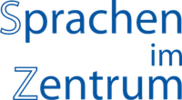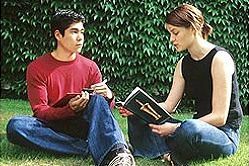Additional courses
The following courses are offered at regular intervals:
Starter kit German for international students
Scope and content: 2 credit hours, German course as a first introduction to the German language at level A1 (CEFR).
Description: "Starter kit German" offers international students a first introduction to the German language. Students learn basic structures and vocabulary to be able to communicate in everyday situations. The focus of the course is on speaking and the grammatical structures necessary for this.
Sprachlich sicher im Studium (B2/C1)
Scope and content: 2 credit hours, German course for developing German language skills in university studies at levels B2/C1 (CEFR).
Description: The aim of the course is to improve oral expression in situations typical for studying. We will practise the means of expression and structures that students can use for active participation in a seminar, for cooperation with fellow students and for office hours. The focus of the course will be on the verbalisation of complex contexts and on presentation. Grammatical structures typical for specialised language will be repeated and practised as needed. The selection of learning content takes into account, as far as possible, the fields of study represented in the course.
Conversation course A1.1
Scope and content: 2 credit hours, German course for developing conversational skills at level A1.1 (CEFR).
Description: The A1 conversation course offers international students a first introduction to the German language. Students are given the opportunity to use the structures they have learnt and practice everyday situations. The focus of the course is on speaking and the necessary grammatical structures.
Conversation course B1
Scope and content: 2 credit hours, German course for developing conversational skills at level B1 (CEFR).
Description: This course offers participants the opportunity to practice their conversational skills and complements German courses 5 and 6 (levels B1.1 and B1.2). Participants lean how to converse appropriately in everyday and university settings. This includes practising reporting, narration, argumentation and contradiction. In this course, learners can improve their ability to express themselves, their pronunciation, fluency and vocabulary.
Creative writing (level B1.2+)
Scope and content: 2 credit hours (a total of 24hrs), writing course to promote creative expression, from level B1.2 (CEFR).
Description: This course offers participants with a knowledge of German at intermediate level the opportunity to explore and further develop their writing skills. As opposed to standardised writing, participants in this course will have the freedom to work on their written assignments with a great deal of creativity and imagination. The writing process will be supervised by the teacher. Written texts will be discussed in a group setting and corrected or edited with regard to comprehensibility and expression. Participants are invited to make free, creative use of typical characteristics of well-known types of texts, e.g. fairy tales, detective stories, letters, poems and short stories. Further, the course will be augmented by elements of music, theatre and art. In this way, each participant's individual capacity for self-expression will be promoted. The texts produced will be collected in a portfolio and printed so that participants have a finished product to present at the end of the course.
Reading course (level B1.2+)
Scope and content: 2 credit hours (a total 24hrs), reading and discussion of texts by German-speaking authors, from level B1.2 (CEFR).
Description: This reading course will cover a wide range of literary texts as appropriate for the intermediate level. By reading and discussing texts by German-speaking authors, participants improve their ability to express themselves in German while deepening their knowledge of Germany. A variety of methodical approaches and reading techniques are used. On the basis of the selected texts, students will produce texts ranging from argumentative texts to creative writing. In this way, students' ability to express themselves in writing will be enhanced as well as their ability to express themselves verbally.
Grammar course (level B2+)
Scope and content: 2 credit hours (a total of 24 hrs), academic language structures, from level B2+ (CEFR).
Description: This advanced level course focuses on teaching grammatical structures commonly used in academic language and which therefore represent a linguistic basis for research and teaching at the University. The point of departure here is intensive textual analysis, starting with reception of the structures to analysis and processing, and then to application by the student. Particular attention is paid to grammar for specific types of texts. The objective of this course is to familiarise students of German with the most common linguistic academic structures so that they can not only understand and recognise them but also actively use them themselves.
Academic Writing - reading and writing (level B2.2+)
Scope and content: 2 credit hours (a total of 24hrs), academic working techniques, from level B2.2 (CEFR).
Description: This advanced level course familiarises participants with academic working techniques and characteristics of academic language. Participants learn to identify essential content in academic texts and to reproduce it in the form of summaries and excerpts. Further, they practise the correct use of research literature, with special attention being paid to citation and bibliography. In the course of the seminar, participants develop a question regarding an academic topic of their own choosing, as well as an accompanying methodology and structure. Finally, they are expected to outline and describe their academic project in the form of an introduction to a term paper.
Pronunciation training (level B2-C2)
Scope and content: 2 credit hours, course for improving pronunciation in German from level B2 (CEFR).
Description: The aim of this course is to improve the pronunciation of German. Using selected exercises, we practise the typical word and sentence accent as well as melody (prosody). We also practice the articulation of individual sounds (phonemes), sound combinations and reductions based on the individual difficulties of the course participants. Various listening exercises are used to specifically train the ear, which is an important prerequisite for correct pronunciation.


